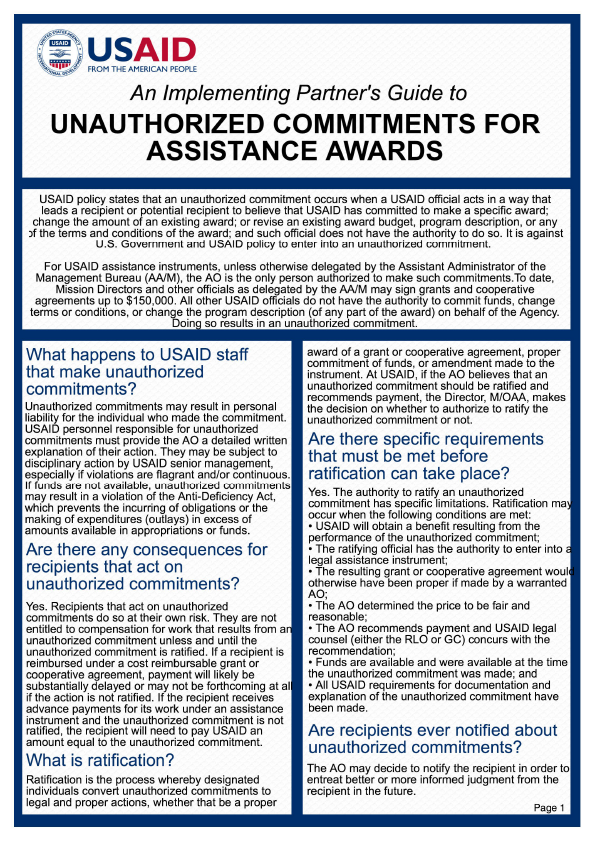USAID policy states that an unauthorized commitment occurs when a USAID official acts in a way that leads a recipient or potential recipient to believe that USAID has committed to make a specific award; change the amount of an existing award; or revise an existing award budget, program description, or any of the terms and conditions of the award; and such official does not have the authority to do so. It is against U.S. Government and USAID policy to enter into an unauthorized commitment.
For USAID assistance instruments, unless otherwise delegated by the Assistant Administrator of the Management Bureau (AA/M), the AO is the only person authorized to make such commitments.To date, Mission Directors and other officials as delegated by the AA/M may sign grants and cooperative agreements up to $150,000. All other USAID officials do not have the authority to commit funds, change terms or conditions, or change the program description (of any part of the award) on behalf of the Agency. Doing so results in an unauthorized commitment.
What happens to USAID staff who make unauthorized commitments?
Unauthorized commitments may result in personal liability for the individual who made the commitment. USAID personnel responsible for unauthorized commitments must provide the AO a detailed written explanation of their action. They may be subject to disciplinary action by USAID senior management, especially if violations are flagrant and/or continuous. If funds are not available, unauthorized commitments may result in a violation of the Anti-Deficiency Act, which prevents the incurring of obligations or the making of expenditures (outlays) in excess of amounts available in appropriations or funds.
What is ratification?
Ratification is the process whereby designated individuals convert unauthorized commitments to legal and proper actions, whether that be a proper award of a grant or cooperative agreement, proper commitment of funds, or amendment made to the instrument. At USAID, if the AO believes that an unauthorized commitment should be ratified and recommends payment, the Director, M/OAA, makes the decision on whether to authorize to ratify the unauthorized commitment or not.
Are there specific requirements that must be met before ratification can take place?
Yes. The authority to ratify an unauthorized commitment has specific limitations. Ratification may occur when the following conditions are met:
- USAID will obtain a benefit resulting from the performance of the unauthorized commitment;
- The ratifying official has the authority to enter into a legal assistance instrument;
- The resulting grant or cooperative agreement would otherwise have been proper if made by a warranted AO;
- The AO determined the price to be fair and reasonable;
- The AO recommends payment and USAID legal counsel (either the RLO or GC) concurs with the recommendation;
- Funds are available and were available at the time the unauthorized commitment was made; and
- All USAID requirements for documentation and explanation of the unauthorized commitment have been made.
Are recipients ever notified about unauthorized commitments?
The AO may decide to notify the recipient in order to entreat better or more informed judgment from the recipient in the future.
Key Takeaways
- An unauthorized commitment occurs when a USAID official acts in a way that leads a recipient or potential recipient to believe that USAID has committed to make a specific award; change the amount of an existing award; or revise an existing award budget, program description, or any of the terms and conditions of the award; and such official does not have the authority to do so.
- Only an AO may legally commit to obligate funds or modify awards on behalf of the government.
- Unauthorized commitments may be ratified. Ratification requires substantial documentation, including a detailed explanation of the facts surrounding the unauthorized commitment.
- The ratification process is onerous, and for good reason. Unauthorized commitments violate federal law and USAID policy and carry severe negative consequences for all parties.
3.8.17
Developed by USAID/India’s Regional Financial Management Office and Regional Office of Acquisition and Assistance and the Central and South Asia Acquisition and Assistance Lab in support of Local Capacity Building.








Comment
Make a general inquiry or suggest an improvement.